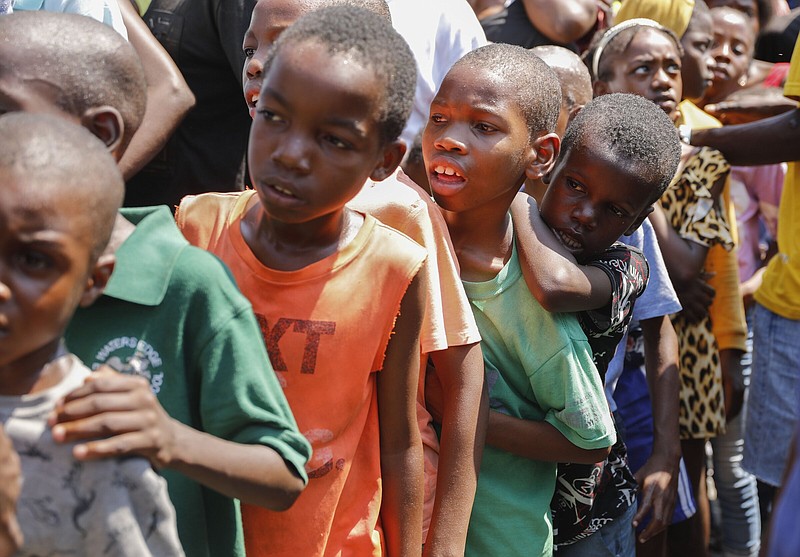PORT-AU-PRINCE, Haiti -- A crowd of about 100 people tried to shove through a metal gate in Haiti's capital as a guard with a baton pushed them back, threatening to hit them. Undeterred, children and adults alike, some of them carrying babies, kept elbowing each other trying to enter.
"Let us in! We're hungry!" they shouted on a recent afternoon.
They were trying to get into a makeshift shelter in an abandoned school. Inside, workers dipped ladles into buckets filled with soup that they poured into plastic foam containers stuffed with rice to distribute to Haitians who have lost homes to gang violence.
Some 1.4 million Haitians are on the verge of famine, and more than 4 million require food aid, sometimes eating only once a day or nothing at all, aid groups say.
"Haiti is facing a protractive and mass hunger," Jean-Martin Bauer, Haiti director for the United Nation's World Food Program, told The Associated Press. He noted that Croix-des-Bouquets, in the eastern part of Haiti's capital, "has malnutrition rates comparable with any war zone in the world."
Officials are trying to rush food, water and medical supplies to makeshift shelters and other places as gang violence suffocates lives across Port-au-Prince and beyond, with many trapped in their homes.
Only a few aid organizations have been able to restart since Feb. 29, when gangs began attacking key institutions, burning police stations, shutting down the main international airport with gunfire and storming two prisons, releasing more than 4,000 inmates.
The violence forced Prime Minister Ariel Henry to announce early Tuesday that he would resign once a transitional council is created, but gangs demanding his ouster have continued their attacks in several communities.
Bauer and other officials said that the gangs are blocking distribution routes and paralyzing the main port, and that the World Food Program's warehouse is running out of grains, beans and vegetable oil as it continues to deliver meals.
"We have supplies for weeks. I'm saying weeks, not months," Bauer said. "That has me terrified."
Inside the makeshift shelter at the school, things were a bit more orderly, with scores of people standing in line for food. More than 3,700 shelter residents compete for a place to sleep and share a hole in the ground for a toilet.
Marie Lourdes Geneus, a 45-year-old street vendor and mother of seven children, said gangs chased her family out of three different homes before they ended up at the shelter.
"If you look around, there are a lot of desperate people who look like me, who had a life and lost it," she said. "It's a horrible life I'm living. I made a lot of effort in life and look where I end up, trying to survive."
She said she occasionally ventures out to sell beans to buy extra food for her children -- who sometimes eat only once a day -- but ends up being chased by armed men, spilling her goods on the ground as she runs.
More than 200 gangs are believed to operate in Haiti, with nearly two dozen concentrated in Port-au-Prince and surrounding areas. They now control 80% of the capital and are vying for more territory.
Scores of people have died in the most recent attacks, and more than 15,000 have been left homeless.
The situation has prevented aid groups like Food for the Hungry from operating at a time when their help is needed the most.
"We're stuck, with no cash and no capacity to move out what we have in our warehouse," said Boby Sander, the organization's Haiti director. "It's catastrophic."
Food for the Hungry operates a cash-based program that helps some 25,000 families a year by sending them money, but he said the ongoing looting and attacks on banks have crippled the system. "Since Feb. 29, we have not been able to do anything at all," he said.
On a recent morning, the fragrance of cooking rice drew a group of adults and teenage boys to a sidewalk near a building where aid workers prepared meals to distribute to shelters elsewhere in the city.
"Can you help me get a plate of food? We haven't had anything to eat today yet," they asked people going in and out of the building. But their pleas went unanswered. The food was destined for the shelter at the school.
"We know it's not a lot," said Jean Emmanuel Joseph, who oversees food distribution for the Center for Peasant Organization and Community Action. "It's too bad we don't have the possibility to give them more."
At the shelter, some adults and children tried to get back in line for a second serving. "You already had a plate," they were told. "Let others get one."
USAID said some 5.5 million people in Haiti -- nearly half the population -- need humanitarian aid, and pledged $25 million in addition to the $33 million announced earlier this week.
Bauer, with the U.N., said the humanitarian appeal for Haiti this year is less than 3% funded, with the World Food Program needing $95 million in the next six months.
"Conflict and hunger in Haiti are moving hand-in-hand," he said. "I'm frightened about where we're going."
